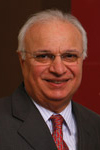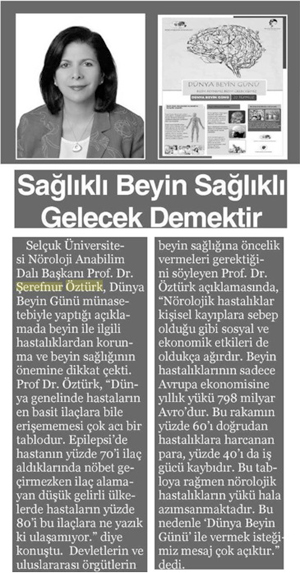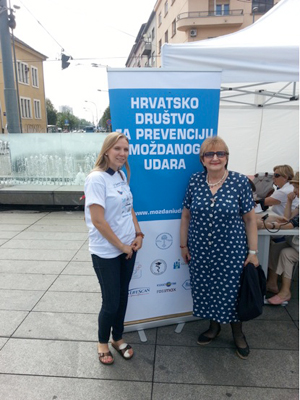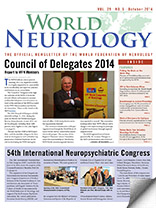PRESIDENT’S COLUMN

Raad Shakir
During the summer of 2014, an important date was introduced into the neurological calendar with the creation of the first World Brain Day (WBD) on July 22 – the anniversary of the founding in 1957 of the WFN. This was celebrated across the world. Many neurological associations publicized the marvels of the brain and promoted neurological care. The impact on decision makers and on the public will take time to evaluate.
World Brain Day Across the Globe
There were many examples. The Times of India published a World Brain Day Supplement and its reporter from Nagpur detailed the events happening in that city, which lies at the heart of India:

Figure 1. Prof. Serefnur Ozturk, president of the Turkish Neurological Society. Article in a local newspaper (Anadolu manjet, konya, 23 temmuz) talking about the World Brain Day.
“Listen to the heart, goes a saying. But science eulogizes the brain, which controls every organ, including the heart. Unfortunately, the general public as well as doctors have not accepted the importance of the brain over the heart. Hence, the World Neurological Federation (WNF) has declared July 22 as World Brain Day to create awareness about early detection of brain diseases and trauma, and understand their importance over other diseases. Dr. Chandrashekhar Meshram, national president of Indian Academy of Neurology, has extended the awareness drive to a ‘Brain Week’.”
The Supplement highlighted many facts and figures on neurological diseases including the fact that “15 percent people suffer from neurological (brain) disorders.”
Prof. Mohammad Wasay, chair of the public awareness committee, WFN, and I had the pleasure of participating in a Skype appearance at the Janakapuri Super Speciality Hospital in New Delhi organized by Prof. Man Mohan Mehndiratta. This was well attended, and there was a lively question-and-answer session. Similar events happened elsewhere: for instance, in Kolkata with Prof. Arabinda Mukherjee, president-elect of the Indian Academy of Neurology.
Another example of the intense media coverage of WBD was in Turkey. (See Figure 1.) Prof. Serefnur Ozturk, president, Turkish Neurological Society, worked hard to promote the day, and many Turkish newspapers covered the activities.
In Zagreb, Croatia, Prof. Vida Demarin and Olga Plazibat, secretary of the Croatian Stroke Society, are pictured in Kvaternik’s Square promoting WBD. (See Figure 2.)
The WFN is most grateful to the EAN for the coverage WBD had in Europe with the publication in Neuropenews. Prof. David Vodusek (Slovenia), one of the current editors, had the poster and news publicized across Europe.
Prof. Marco Medina notified all Latin American societies to celebrate WBD in their countries.
Following this global success, the WFN is looking to consolidate the first WBD by involving the WHO and all its regions in the next one on July 22, 2015.
WFN Grants
The WFN has decided on its grants allocations for 2014. The number of applicants was again healthy, and the reviewers were active in their advice. Perhaps one of the most important aspects of the process is the collaboration with neurology specialty organizations and World Brain Alliance members in partnering the WFN for funding. This is the essence of international collaboration for the advancement of neurology.
World Health Organization
The collaboration with the WHO continues, and the time has come for all to participate in the second edition of the Neurology Atlas. All WFN member societies have received a questionnaire from the WHO on the status of neurology in their countries. This coupled with information from governmental health authorities should produce a comprehensive picture on the status of neurological services and availability of all facilities needed in neurological practice. I am positive that all neurological societies will provide information to update the current atlas, which is now 10 years old.

Figure 2. Prof. Vida Demarin (right) and Olga Palzibat at World Brain Day in Zagreb.
The WHO is moving full speed ahead with ICD11, and the process is making progress. The neurology section is nearly complete, but there remains a number of issues, which need further action. Many of you have contributed and given of your time and experience to the project. As with any major endeavor, at the end of the day, the WHO coding team will have the final say in the layout of the classification, and we may have to accept some compromises. There are many areas up for discussion, and one has to say that the WHO has been most helpful and accommodating to the neurosciences and has agreed to many reasonable requests without any major difficulties. As an example; the issue of Prion diseases is under discussion now. In ICD10, it was classified under ‘slow virus infection’. Now the whole classification and etiology is clarified; however, the issue of transmissibility is being discussed, with the infectious diseases group. Double parenting of various conditions and their coding is being discussed, and compromises are happening across the classification.
Changes in the Constitution and Bylaws
The WFN is embarking on a major change in its trustees’ structure. Over many years, the organization of the WFN has been under review, and we have had several recommendations to divide the position of secretary-treasurer general into two posts. This has gone through many committees, in particular the Constitution and Bylaws Committee. The WFN’s legal adviser has now looked at the proposal, and it was put to the Council of Delegates as a recommendation from the trustees at their meeting in Boston. Thereafter, the Nominating Committee will look for suitable applicants for the post of treasurer, and the Council of Delegates will make a selection during the forthcoming World Congress in Santiago in November 2015.
Election of a Trustee
By the time this column is published, the Council of Delegates meeting will have elected a new trustee to replace Prof. Gustavo Roman who has completed two terms of office. My two predecessors Vladimir Hachinski and Johan Aarli, both of whom have worked with Gustavo, and I would like to register our appreciation for all of the years of service he has given to the WFN. His work globally and in particular in Latin America has come to fruition in the establishment of the Pan American Federation of Neurological Societies. His expertise will be called upon to continue working for the WFN. There are four candidates competing for the position of trustee. The trustees welcome the election of Dr. Riadh Gouider as a new trustee; Dr. Gouider will add depth and experience to the WFN management team.
WCN 2015 Santiago
The preparations for WCN 2015 are well under way, and the program is now practically finalized, the abstract submissions opened in October for six months. The scientific program is finalized and the speakers will provide the highest quality of current neurological information for those neurologists in clinical practice and research. Having been to Chile, I can only say that the organization is impeccable, and the country is delightful. I am sure all of us will have a memorable congress in Santiago.
